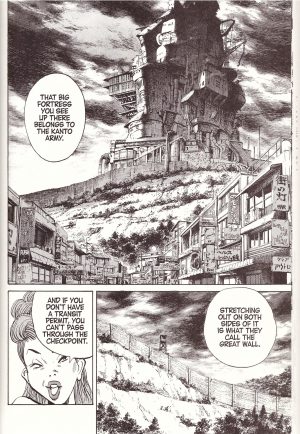Review by Ian Keogh
Given all the speculation there’s been about his music and the appearance of of mysterious and charismatic unknown singer called Yabuki Joe, can Kenji really be alive? Why, this volume’s even titled The Man Who Came Back. Naoki Urasawa’s certainly leading readers down the single direction, but keep those speculations in check as the chapter the volume’s titled after is the last in the book.
Urasawa instead opens with the bombshell revelation that closed Everybody’s Song, which is how Friend’s right hand man Inshu Manjome came to lose his faith. Whether or not Yabuki Joe is Kenji, he’s determined, resourceful and has a way of persuading other people to do what he wants. A key scene occurs when he tries to enter the gate providing access to walled-in Tokyo, prolonged like a Sergio Leone Western with viewpoints shifting and a manic gravedigger making preparations. It’s a further illustration of where Urasawa diverted earlier, discussing the little techniques comic artists use to display subtle differences in emotions. It’s an amazingly tense and inspiring sequence ending with a revelation to match. That ties in with a technique Urasawa consistently applies so confidently, having us make instant judgements about people when there’s actually more to them. Well, sometimes. It’s also astounding that we’re only three volumes from the end, yet Urasawa’s still introducing new characters with a purpose, one of them with deep ties to the past.
A method every writing class applies with regard to plotting a story is to tell students to think of a solution to a problem for their character, then to discount it, as the first thing they’ve conceived is likely to be the first thought to occur to readers. They need to come up with something better, and Urasawa almost always does. By the time we reach it, the ending to the penultimate chapter is hardly a major revelation, but Urasawa’s been so clever, always not just one, but several steps ahead of readers, that he’s effectively sown doubt. Here he supplies the crowd pleaser.
It should also be noted that for some reason this volume is very hard to come by at a reasonable price in these original English language editions. Readers are better advised to pick up 20th Century Boys: Perfect Edition Volume 10, which combines it with the forebodingly titled Humanity in the Balance. As ever, surely anyone who’s read this will want to head straight for it.





